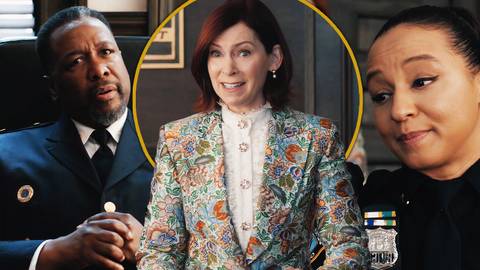
The news broke like a poorly aimed pie in the face of late-night television. Whispers solidified into headlines, then screams: The Late Show was, against all perceived cosmic order, facing cancellation. A collective gasp rippled through the media landscape, a symphony of “how could this be?” and “what now?” But in a sun-dappled, slightly cluttered apartment somewhere in New York City, Elsbeth Tascioni merely tilted her head, a familiar, almost imperceptible shift of a delightfully off-kilter universe.
For Elsbeth, the world was a grand, perpetually unfolding Rube Goldberg machine of human behavior, legal minutiae, and the occasional rogue pigeon. People weren't just individuals; they were patterns, cogs, crucial variables in the delightfully illogical equations that perpetually hummed in her mind. And when a major pattern, like a long-running late-night institution, suddenly dissolved, it didn't signal an ending to Elsbeth. It signaled a redistribution. A rearrangement. A new addition.
“Oh, that’s rather clever, isn’t it?” Elsbeth murmured to herself, her eyes not on the bold print of the news alert but on the intricate dance of dust motes in a sunbeam. “A sudden vacancy. All that… energy. That particular kind of… precision.”
Stephen Colbert, to the rest of the world, was a witty, incisive, perpetually bemused ringmaster of televised discourse. To Elsbeth, he was a highly specialized component. His sharp intellect, his ability to pivot from the profound to the absurd, his very distinct rhythm of inquiry – these weren't simply talents; they were identifying marks of a unique function. The cancellation wasn't a professional crisis for him in Elsbeth’s eyes; it was the unexpected removal of a meticulously crafted piece from one elaborate clockwork, making it available for a different, perhaps even more interesting, mechanism.
So, Elsbeth added Stephen Colbert.
It wasn't a job offer, of course. Elsbeth wasn't in the hiring business, not in the traditional sense. It was an internal designation, a mental slotting. It was akin to a particularly discerning butterfly collector, observing a rare specimen suddenly freed from its previous, restrictive habitat. Ah, yes. He goes here now.
She might not have explicitly told Mr. Colbert of his new status. Her "adding" process was more akin to an intuitive internal filing system. Perhaps she saw a news clip of him looking uncharacteristically contemplative, a flicker of vulnerability beneath the usual comedic armor, and her mind simply clicked. There he is. A perfect fit for… let’s say, the ‘Displaced Luminaries with Unexploited Conversational Capacity’ folder. Or perhaps the ‘Underutilized Wit with Unexpectedly Deep Pockets of Melancholy’ category.
The beauty of Elsbeth's "addition" lay in its complete detachment from the conventional anxieties of the moment. While network executives panicked, agents scrambled, and millions of viewers grieved the perceived end of an era, Elsbeth saw only opportunity. Colbert's sudden availability wasn't a problem to be solved, but a new variable to be integrated into the grand, bewildering, and ultimately fascinating tapestry of human existence she was perpetually weaving in her head.
What would Elsbeth do with her new "addition"? She wouldn't ask him to host her late-night show (she didn't have one). She wouldn't demand a monologue (she preferred monologues of accidental observations). Perhaps, one day, she might encounter him in a coffee shop, and without a flicker of recognition for his celebrity status, simply remark, "You know, the way you pause before delivering a punchline is remarkably similar to the way a certain kind of spider calibrates its web. It’s a very satisfying pattern." And Stephen Colbert, bewildered, perhaps a little touched by the sheer oddity of it all, might just find himself, for a fleeting moment, less a canceled icon and more a newly appreciated, peculiar cog in Elsbeth Tascioni’s wonderfully intricate world.
In a world reeling from disruption, Elsbeth Tascioni offered not solutions, but a peculiar kind of re-categorization. The news of The Late Show's cancellation was merely the prompt for Elsbeth to once again demonstrate her unique genius: turning perceived chaos into a curious, and utterly Elsbeth-ian, new order. And in that, there was perhaps a strange, quiet hope for us all. Even when one door closes, Elsbeth is probably busy adding you to a very interesting new room.
